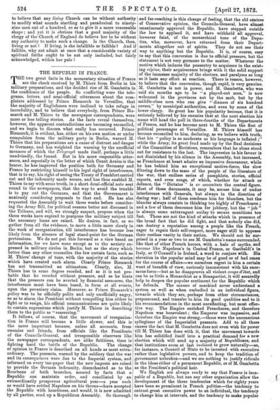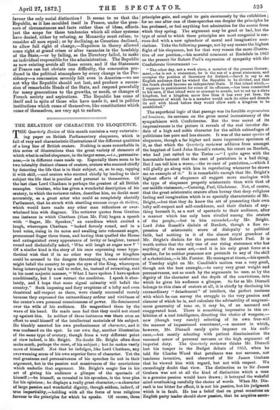THE REPUBLIC IN FRANCE.
THE two great facts in the momentary situation of France are the check received by M. Thiers from Berlin in his military preparations, and the decided rise of M. Gambetta in
the confidence of the people. So conflicting were the tele- grams, letters, and semi-official utterances about the com- plaints addressed by Prince Bismarck to Versailles, that the majority of Englishmen were inclined to take refuge in incredulity, and to believe that everybody, from Prince Bis- marck and M. Thiers to the newspaper correspondents, were more or less telling stories. As the facts reveal themselves, however, the apparent contradictions are becoming reconciled, and we begin to discern what really has occurred. Prince Bismarck, it is evident, has, either on his own motion or under compulsion from the military party in Berlin, warned M. Thiers that his preparations are a cause of distrust and danger to Germany, and has weighted the warning by the unofficial menaces of which the Telegraph made itself, perhaps a little unadvisedly, the funnel. But in his more responsible utter- ances, and especially in the letter of which Count Arnim is the bearer, he has improved the position both for Germany and France by restricting himself to his legal right of interference, that is to say, his right of seeing the Treaty of Frankfort carried out and the indemnity made secure, and has thus enabled M. Thiers to say with some truth, in a short demi-official note sent round to the newspapers, that the way to avoid the trouble is to pay out the Germans, and that the Government is I anxiously considering proposals to that end. He has also requested the Assembly to wait three weeks before consider- ing the Army Bill, for political reasons better not discussed in the Tribune, and will, we strongly suspect, propose when the three weeks have expired to postpone the military subject till the necessary loans are raised. He desires, in fact, as we gather from all the evidence, to move a little more slowly in the work of reorganisation, till interference has become less likely from the absence of legal stand-point for the German pretensions. We do not put this forward as a view based on information, for we have none except as to the anxiety ex- pressed in military circles in Berlin, but as the story which better than any other reconciles the few certain facts, such as M. Thiers' change of tone, with the majority of the stories .which have created such alarm. Clearly Prince Bismarck has not transmitted an ultimatum. Clearly, also, M. Thiers has in some degree receded, and as it is not pro- bable that he receded without pressure, and as he hints that the pressure can be averted by financial measures, the interference must have been based, in form at all events, upon the pecuniary claim. Moreover, a3 Prince Bismarck's policy was to be officially polite and only unofficially angry, so as to alarm the President without compelling him either to fight or to resign, his official communications are quite likely to contain expressions which justify M. Thiers in describing them to the public as "reassuring."
It follows, of course, that the movement of reorganiza- tion in France will become a little slower, and this is the more important because, unless all accounts, from .enemies and friends, from officials like the Presidents of the Councils-General, and irresponsible observers like the newspaper correspondents, are alike fictitious, time is fighting hard the battle of the Republic. The change of opinion in France is described on all hands as most extra- ordinary. The peasants, warned by the soldiery that the war and its consequences were due to the Imperial system, and informed on every tax-paper that the new imposts are raised to provide the German indemnity, disenchanted as to the Bourbons of both branches, assured by facts that a Republic can maintain order, and conciliated by an extraordinarily prosperous agricultural year—a year such as would have settled Napoleon on his throne—have accepted the Republic with heartiness, and would, it is now admitted by all parties, send up a Republican Assembly. So thorough and far-reaching is this change of feeling, that the old centres of Conservative opinion, the Councils-General, have almost unanimously approved the Republic, have stepped outside the law to applaud it, and have withheld all approval, however faint, of the monarchical tone of the Depu- ties, who, moreover, have returned from their Depart- ments altogether out of spirits. They do not see their way to anything but the Republic. It is, of course, easy to say that this conversion is due to official pressure, but the statement is not very germane to the matter. Whatever the motive which induces the peasantry to acquiesce in the exist- ing regime, their acquiescence brings with it the solid support of the immense majority of the electors, and paralyses so long as it lasts any effort at reaction. There is reason, however, to believe that the conversion, though rapid, is very genuine. M. Gambetta is not in power, and M. Gambetta, who was said six months ago to be "a played-out man," is now welcomed in the provinces not by the mob, but by the middle-class men who can give "dinners of six hundred covers," by municipal authorities, and even by some of the lower clergy. So great has his popularity become, that it is seriously believed by his enemies that at the next election his name will head the poll in three-fourths of the Departments of France, and he has become next to M. Thiers the first of
political personages at Versailles. M. Thiers himself has become reconciled to him, declaring, as we believe with truth, that his "policy is as moderate as his language is inflated ;" while the Army, its great feud made up by the final decisions of the Committee of Revisions, remembers that he alone stood out for resistance to the last. The impression in his favour is not diminished by his silence in the Assembly, but increased, as Frenchmen at heart admire an impassive demeanour, while he has behind him an exceptional motive-force, the slow filtering down to the mass of the people of the literature of the war, that endless series of pamphlets, stories, official reports, and even songs, of which, whether for attack or defence, the " Dictator " is ex necessitate the central figure. Most of these documents, it may be, aCCI180 him of undue interference with Generals, but always in the direction of daring war ; half of them condemn him for blunders, but the blunder always consists in thinking too highly of Frenchmen ; and a few of them denounce him for jobbery, but the " job " is always some extravagant outlay to secure munitions too fast. Those are not the kind of attacks which in presence of the broad fact that he did fight, and that nobody else did, can destroy a reputation among a people like the French, eager to regain their self-respect, more eager still to appease their restless vanity in their nation. We should not be sur- prised in a year or two to see M. Gambetta's name surrounded, like that of other French heroes, with a halo of myths, and become like Napoleon's in Central France, or Garibaldi's in Italy, or O'Connell's in Ireland, a word to conjure with. His elevation in the popular mind may be of good or of bad omen for the course of affairs—we ourselves regret in him a certain want of breadth of view, curiously inconsistent with his enor- mous force—but as he disapproves all violent coups d'etat, and can be as little a Monarchist as a Bonapartist, it will assuredly help to deepen the popular sentiment for the Republic which he defends. The masses of mankind never understand a system so well as when embodied in an individual figure, towards which they are, perhaps from other circumstances, prepossessed, and transfer to him its good qualities and to it his recommendations in the most unreflecting, but most effec- tive way. The Empire enriched Frenchmen, and therefore Napoleon was benevolent ; the Emperor was impassive, and therefore the Empire was strong,—those were the unconscious syllogisms of the Imperialist peasants. Add to all these causes the fact that M. Gambetta does not even wish for power till M. Thiers has done with it, that the movement towards him has solidified itself into a practical demand for a new election which will send up a majority of Republicans, and that institutions seem at last inclined to grow naturally—as, for instance, a Council of State to be invested with executive rather than legislative powers, and to keep the tradition of government unbroken—and we Bee nothing to justify ridicule in the ideas either of a permanent Republic, or of M. Gambetta. as the President's political heir.
We English are always ready to say that France is inca- pable of a Republic, but can any other organization allow the development of the three tendencies which for eighty years have been so prominent in French politics—the tendency to entrust great executive power to an individual, the tendency to change him at intervals, and the tendency to make popular favour the only social distinction ? It seems to us that the Republic, as it has moulded itself in France, under the pres- sure of circumstances and facts rather than of ideas, affords just the scope for these tendencies which all other systems have denied, either by refusing, as Monarchy must refuse, to consider all men equal ; or by declining, as Cassarism declined, to allow full right of change,—Napoleon in theory allowed some right at grand crises or after vacancies in the headship of the State,—or by failing, as the Directory failed, to make an individual responsible for the administration. The Republic as now existing avoids all these errors, and if the Statesmen of France can but obviate one difficulty, the concussion pro- duced in the political atmosphere by every change in the Pre- sidency—a concussion severely felt even in America—we see not why the Republic should not last, and produce a succes- sion of remarkable Heads of the State, and respond peacefully for many generations to the growths, or needs, or changes of French society and aspirations. The Republic has come of itself and in spite of those who have made it, and in politics institutions which come of themselves, like constitutions which come of themselves, are very apt to endure.



































 Previous page
Previous page